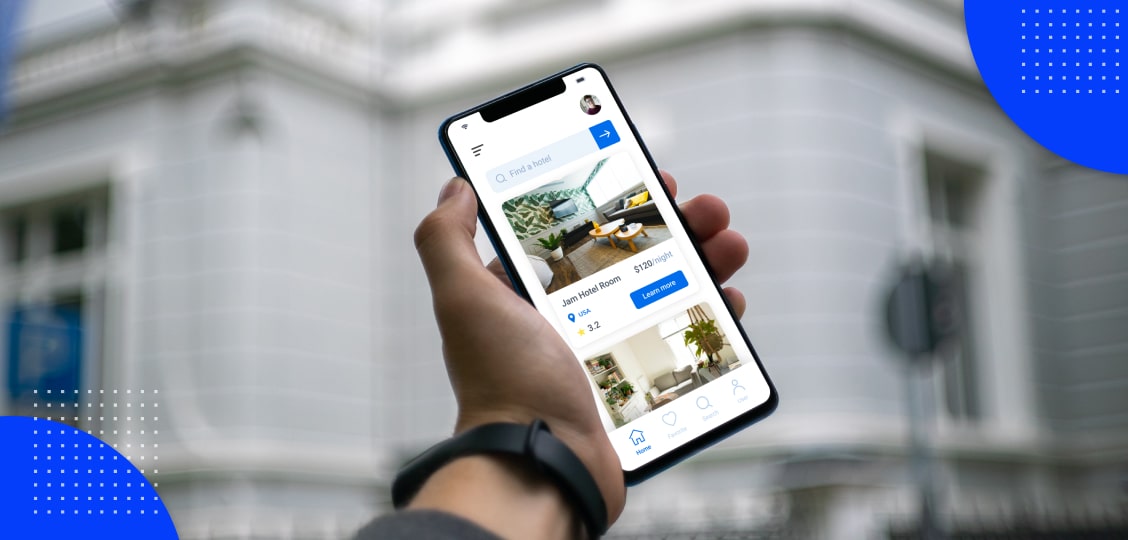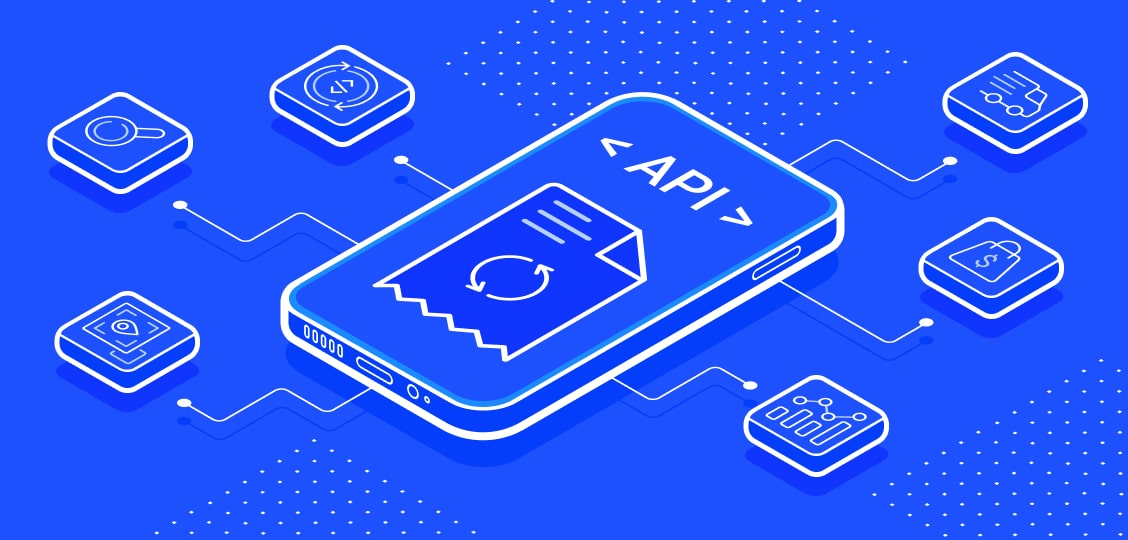Best API software you can integrate into your online marketplace platform
Check out the list of top API marketplace software, from payment gateways and data analytics to order and inventory management.

The popularity of digital platforms connecting hoteliers and travelers has significantly increased over the past decade. Accommodation booking websites allow for searching hotels or apartments by numerous parameters, assessing customer feedback, and making payments.
Since the travel industry is expected to see rapid growth after the end of COVID-19, the development of an online lodging marketplace is an excellent investment opportunity.
However, before building a marketplace platform, a company should plan the budget and timeline necessary for implementation. It is also important to conduct competitor analysis and identify the most essential features.
This article describes how to create a website like Booking.com, from cost estimation to design and technology stack recommendations. Additionally, you will take valuable insights into the history and success formula of Booking.com.
The design of an online lodging marketplace has a direct impact on user retention and ROI. Experts say that more than 46% of customers access the credibility of web solutions based on their visual appeal, involving layout, font sizes, images, typography, and color schemes. Therefore, it is crucial to create a web design that will engage travelers and hoteliers.
When building an online marketplace, designers should:
Ensure a seamless user experience (UX). A software development team should provide smooth navigation, search across numerous filters, and convenient menu structure. It is also important to elaborate an information architecture in such a way that users can interact with the website without even thinking.
For example, designers need to implement a logical flow of pages while making the transition between them fast and simple. For the purpose of increasing customer engagement, you can enable uploading and viewing of 360° panoramic images.
Implement a unique branding style. If you strive to make a website like Booking.com and achieve success, you should create a custom design that will align with the audience’s preferences.
Using a template will help you reduce project costs but significantly increase chances to meet a clone of an online lodging marketplace. In addition, it will be more difficult to optimize the website for search engines and ensure responsiveness.
Find out the top 7 principles of a quality software design in the article written by Andrew Volchek, CEO and Co-founder at Arateg.
Considering the amount of time necessary for creating a UI/UX design, a software development team generally needs between 3–4 weeks for executing this project stage.
Time: 200 hours
When making a lodging reservation website like Booking.com, it is crucial to provide multi-option registration, for instance, via social network accounts (Twitter, Facebook, Instagram, etc.), email, and Google. Additionally, you should not oblige users to sign up on the platform to access its functionality. To improve customer satisfaction, it is reasonable to ask them to register only before making a reservation.
With the view of enforcing data security, software engineers should implement two-factor authentication, requiring a user to provide an additional credential besides login and password.
Time: 40-80 hours
A personal profile generally contains information such as name, age, country, city, booking/payment history. It should also include a user dashboard allowing customers to view their wish lists, reviews, reservations, and notifications.
Time: 80 hours
An accommodation booking website like Booking.com has to enable search across multiple filters, for example, user budget, property type, number of rooms/beds/travelers, distance from the center, room facilities, star rating, and review score.
To draw the attention of potential customers, it is important to place a search system right on a home page, which is usually the first thing visitors see when visiting a website. In addition, a home page can feature the most popular destinations, top-rated hotels and apartments, as well as special offers. Thanks to this, property owners will enhance user experience and increase revenues.
Time: 100-120 hours
The review and rating section is an important feature of every marketplace, involving a website like Booking.com. Becoming familiarized with customer feedback, users can estimate the quality of services and choose the best options.
For the purpose of preventing fake testimonials, it is crucial to open commenting for a particular property only to travelers who had actually reserved and used the accommodation. This will boost the credibility of a digital marketplace platform. Hoteliers, in their turn, will be able to access the level of client satisfaction and identify issues that should be resolved.
Time: 120 hours
Geolocation is another feature that you should implement when creating an online accommodation booking platform. Recognizing an IP address, a marketplace website like Booking.com can identify user location and deliver personalized offers.
To improve customer engagement, a company can incorporate maps enabling travelers to check out the location of apartments in the city. For instance, software developers can integrate Google Places and Google Maps to let users view the number of cafes, restaurants, museums, squares, national parks, etc. near each hotel or house.
Time: 120 hours
A hotel reservation website like Booking.com should notify customers about special deals and offers, changes in reservation details, as well as remind them about upcoming trips. When building an online marketplace, it is possible to enable email, browser, and smartphone notifications.
Time: 160-200 hours
This page contains a property description that generally involves prices, availability, reservation policy, room photos and facilities, customer reviews, hotel overview, the number of rating stars. In addition, you should provide the possibility to add an apartment or hotel to a wish list.
Time: 100 hours
Online accommodation reservation is a top-priority feature of a marketplace website like Booking.com. A customer should be able to choose a room type, select the number of guests and beds, view additional options, as well as check out a reservation policy, including terms of payment and cancellation.
Furthermore, travelers should have the possibility to indicate the arrival and departure times on a calendar. When booking a property, a guest has to fill out information such as name and contacts (email, phone number).
Time: 160 hours
When creating an accommodation booking platform, it is essential to offer various payment options for satisfying the needs of the global audience. Representing an analog of a digital third-party terminal, a payment gateway allows for carrying out digital transactions using a range of methods.
For example, the integration of Braintree will enable travelers to pay for services via PayPal, Venmo, credit and debit cards (Visa, Mastercard, Amex, Diner’s Club, etc.), e-wallets (Samsung Pay, Google Pay, Apple Pay, Secure Remote Commerce), bank directs (e.g., iDeal, SOFORT, GiroPay, and Trustly), ACH Direct.
Being available in over 200 countries and regions, PayPal lets customers use payment cards (Visa, Mastercard, Amex, Discover, etc.), PayPal balance, PayPal Credit, collected user rewards, and bank account.
Furthermore, gateways help organizations ensure data security by providing features like 3D Secure, AVS (Address Verification System), and CVV (card verification code check).
Popular systems generally implement extra measures to protect sensitive information. For instance, PayPal employs artificial intelligence to instantly detect fraudulent activities and prevent potential risks.
As a gateway service is an off-the-shelf solution, software engineers don’t have to implement it from scratch. As a result, you cut expenditures and time to market.
Learn how to choose a payment gateway for a hotel reservation website like Booking.com that will meet the needs of each party.
The process of property owner registration is more complicated in comparison with customer sign-up. An online lodging marketplace has to require information such as name, address, contacts, property category, general overview, photos, facilities, price, reservation policy, and payment methods. After filling out the necessary details, hoteliers should have the possibility to check everything out before confirmation.
Time: 80 hours
Property management is another key feature of a hotel reservation website like Booking.com. A marketplace has to provide vendors with the possibility to easily add, edit, and remove properties and related information that includes photos, facilities, payment options, and room availability.
Time: 100 hours
When making an accommodation booking platform, it is important to allow hoteliers to keep track of all reservations with their status, for example, paid, canceled, or in progress. Service providers should also have the ability to cancel bookings in certain cases.
To implement this functionality, software engineers can create a user dashboard according to project requirements.
Time: 200 hours
Property owners have to be instantly alerted about reservations, cancellations, and incoming requests. Depending on your business-specific needs, online marketplace developers can set up email, browser, and smartphone notifications.
Time: 160-200 hours
With payment management, vendors can track online transactions, calculate the volume of sales, and make refunds. To facilitate the work of hoteliers, you can implement reporting functionality, so that they can visualize their income for different periods.
Serving as a web app, an administrator panel enables the owners of an online lodging marketplace to manage accommodations and listings, verify hotel licenses, monitor customer feedback, track payments, set up commissions, as well as view reservation histories.
In order to enforce security, we recommend that you implement role-based access permissions for employees to track who introduced which changes.
Time: 2000–2500 hours
The price of building an online lodging marketplace depends on implementation time and software expert salaries that may significantly vary from region to region. For instance, the average hourly rates of US and UK software engineering firms are $50–$150 while in Western Europe they earn $40–$100.
However, software development companies in Belarus generally charge $20–$50 per hour.
Now, let’s take a look at the budget necessary to create a website like Booking.com depending on the location of an IT service vendor:
Therefore, project outsourcing to Belarus or another country can enable you to reduce costs by 2.5–3 times while saving software solution quality.
To create a lodging reservation website like Booking.com, software engineers can use a technology stack such as:
Online marketplace developers can integrate a platform with various third-party application programming interfaces (APIs) for:
Check out a complete list of APIs you can integrate an accommodation booking website with.
When making a hotel reservation website like Booking.com, it is essential to achieve scalability, high availability, and fault tolerance. Thanks to this, you will prevent downtime, deliver a better user experience, and save costs.
Since systems of this kind generally operate with sensitive data, software experts have to enable security to protect against various threats. Software experts can utilize cloud computing platforms like AWS and Microsoft Azure that have all the necessary tooling for addressing these challenges.
Before creating an online hotel reservation platform, it is crucial to research competitors and analyze success stories of marketplaces like Booking.com. By taking valuable insights, you will identify top-priority features and create a unique selling proposition much easier.
Established in 1996, Booking.com has transformed from a website for listing hotel rooms to the world’s leading digital travel company. The startup was founded by Geert-Jan Bruinsma who turned to Hilton.com to book a hotel room in Amsterdam. However, it was not possible, so he decided to provide online room reservations in the country.
Booking.com has always been featuring an open platform, which means that property owners agree to the listed terms and guidelines. This simple business model helped the company attract hoteliers.
In 2005, the startup was acquired by The Priceline Group for $133 million. In 2010, the company released a mobile app for iPad and next year—for Android. In October 2012, Booking.com created the first application for Microsoft Windows.
At the moment, Booking.com is a business-to-consumer marketplace that offers more than 6.2 million homes, hotel rooms, apartments, and other places to stay. With 28+ million listings, the platform is available in 43 languages and 155,000+ destinations.
From the beginning, the website generated revenue by charging a commission from hotels for each booking made through the system. Now the commission varies between 10%-30% depending on the hotel size and ranking. Therefore, vendors pay a higher fee for having higher positions.
In 2019, the organization’s income accounted for over $15 billion, according to Statista. However, the revenue decreased to nearly $6.8 billion in 2020 due to the COVID-19 outbreak.
To remain competitive, the company aims to constantly improve client service. Booking.com makes use of artificial intelligence and machine learning technologies to analyze customer data and ensure an amazing user experience.
It also employs hundreds of metrics to evaluate user satisfaction and identify what marketplace features contribute to completed reservation or cancelation.
Furthermore, the organization encourages experimentation to find out the best way to present things for both travelers and property owners. For instance, Booking.com tests different versions of user interfaces before deployment.
Arateg was founded in 2014 to assist organizations in addressing business challenges and making the life of people more comfortable. Based in Eastern Europe, Arateg is an online marketplace development company that builds web and mobile solutions that align with end-user needs.
In order to ensure a seamless user experience, we employ cutting-edge technologies to achieve scalability, high availability, performance, and security. By implementing best practices (e.g., CI/CD, TDD), our engineers speed up the feature release cycle while enhancing product quality.
Additionally, we can help you conduct market research, prepare a technical specification, prioritize features, choose a technology stack and software architecture, as well as outline a roadmap for delivery.
By now, our software experts have created dozens of marketplace apps and websites. Check out a list of our featured projects.
If you want to launch a lodging reservation website like Booking.com, contact our team. We will get back to you within 1 business day and help resolve all issues. To protect your intellectual property, we are ready to sign an NDA before a detailed project discussion.

Check out the list of top API marketplace software, from payment gateways and data analytics to order and inventory management.

Check out an ultimate guide to making a food delivery app like Uber Eats, including development time and cost. Learn what features you should implement to meet end-user needs.
Now, you will receive a fresh newsletter from us.
Get the latest scoop on software application tips, announcements, and updates from us. Subscribe to our newsletter!